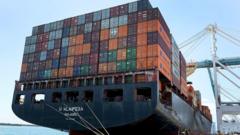The WTO's latest report highlights severe risks and anticipates a substantial drop in North American trade as the repercussions of US tariffs unfold.
US Tariffs Threaten Global Trade Stability, Warns WTO

US Tariffs Threaten Global Trade Stability, Warns WTO
Global trade may face significant declines due to US tariff policies, according to the World Trade Organization.
The World Trade Organization (WTO) has issued a warning indicating that global trade is expected to experience a downturn this year, primarily due to tariffs imposed by US President Donald Trump. The organization pointed out the potential for "severe downside risks," such as retaliatory tariffs and rising political uncertainty, which could exacerbate the decline of goods trade on a global scale. They specifically noted that the North American region might see a trade drop exceeding 10%.
Ngozi Ikonjo Iweala, the WTO director-general, expressed deep concern over the increasing "decoupling" between the US and China. The WTO's previous projections of a 2.7% growth in global goods trade by 2025 have been revised down to a slight decline of 0.2%. Chief economist Ralph Ossa emphasized that tariffs wield significant unintended consequences, particularly the dampening impact of trade policy uncertainty, which reduces exports and stifles economic momentum.
On April 5, a baseline tariff of 10% on nearly all foreign imports to the US took effect, although certain exceptions exist. Conversely, tariffs imposed on goods from China are far higher, now averaging around 145%. This uncertainty has resulted in a drop in US stock market indices at the opening of trading on Wednesday.
Despite projections of diminishing trade with the US, the WTO cites that some regions, such as Asia and Europe, are anticipated to see modest growth in both imports and exports this year. The report further notes a positive overall contribution from various other regions to world trade growth.
In a first for the organization, the report included a forecast for services trade, which involves the selling and purchasing of services between nations, commonly in sectors like tourism and finance. The WTO predicts a 4% growth in services trade by 2025, which is approximately one percentage point lower than previously anticipated.
Since taking office in January, Trump has been vocally supportive of tariffs, asserting that these import taxes will stimulate US consumer spending on domestically produced goods, increase tax revenues, and lead to vast investment opportunities. However, critics argue that revitalizing US manufacturing is inherently complex and could necessitate decades of effort, all while the economy grapples with short-term challenges.
In response to backlash, Trump has rescinded several tariff announcements, including a 90-day pause on tariffs affecting many nations except China shortly after their implementation, reflecting growing pressures from both the political sphere and market dynamics. In March, the governor of the Bank of England also cautioned that these tariffs might adversely affect the financial situation of UK consumers.




















